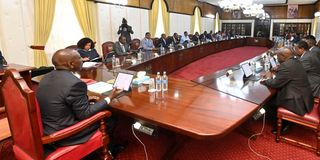Pending bills is indictment on State

President William Ruto and Cabinet Sectaries during a past Cabinet meeting at State House, Nairobi. The Cabinet has approved the establishment of a special committee on Pending Bills.
Looking for honest suppliers of goods to the Kenyan government is as hard as locating a pin in a haystack. However, does it mean that all suppliers to the government are dishonest and/or corrupt?
I am asking this because the issue of pending government bills is one that needs to be put to bed once and for all. Kenyans have had a history of fleecing the government by supplying ‘air’ worth millions of dollars—as we saw with Kemsa I scam—but there has got to be honest traders who supplied the government and are now suffering as it imposes blanket punishment on all suppliers.
The dichotomy of pending bills and corruption is one that, perhaps, overshadows the government’s responsibility to its suppliers. Corruption has such a hold on Kenya’s psyche that everybody is deemed to be corrupt. This is a problem that could have been avoided had corruption been dealt with head-on from the moment the first graft cases were reported. Fast-forward to 60 years of Kenya’s existence and the problem has grown such deep roots that special measures are needed to end it and save businesses and the economy.
The government, with all its corrupt officials, has every right to doubt the suppliers. You set a thief to catch a thief, after all. But on the other hand, the government’s fears of the hordes of bogus suppliers taking advantage of a corrupt system and putting in non-existent invoices is valid. This is still not a good enough reason to withhold payments to genuine suppliers.
Private businesses
By acting as it has, the government is in breach of the law. Anybody else, including private businesses, who takes goods and services and fail to pay for them would face the full force of the law. Why is the government getting away with it?
Organisations in Kenya, not just the government, have the tendency not to pay for either goods or services duly delivered. Having been a victim of unpaid wages in Kenya, I should know! If there exists a contract between two parties and one keeps the end of their bargain by supplying goods or services, then the recipient is obliged by law to pay up the agreed amount. It is also moral and ethical for everyone to pay what they owe.
Withholding payments undermines traders’ businesses and takes away from them the ability to reinvest and grow their businesses. Some traders have employees to cater for and their jobs would also be put at risk. Then there’s the obvious impact outstanding payments would have on the economy: The longer bills stay unpaid, the longer businesses fail to thrive as a result.
Some traders are forced to spend extra money seeking legal assistance in a bid to get their money, negatively impacting on businesses further. The state of the Judiciary does not instil confidence either; the courts are too underfunded and short of staff to deal with complaints. The Small Claims Courts and the Labour and Employment Court should be bolstered to fast-tract complaints brought to them by traders and workers affected by unpaid bills.
Corruption is the cradle of all our economic problems. The less being done to end it, the more it would grow. Punishing traders or suppliers whom we deem to be corrupt but do next to nothing to deal with corruption within the government is disingenuous and counterproductive.
Corruption
A government that holds on to payments to suppliers for suspected corruption should look in the mirror to see the skeleton (corruption) in its cupboard and get rid of it. If the government had set a better example of running a clean government, it would trickle down to everyone else in the country, including ‘tenderpreneurs’, to work honestly and transparently. ‘Cartels’ are made not born!
The best way to end the impasse on pending bills is to set up a system whereby it is easier to filter the bona fide traders from bogus ones. In this Digital Age, it beggars belief why there should still be hiccups when it comes to trading with the government. The days of invoices being written on Kasuku exercise books are long gone. The digital system should make it easier for business transaction between the government and suppliers. The crucial aspect of that transaction should be a time limit within which the suppliers can get their money. The same goes for salaries.
The government cannot be the first to breach labour and contract laws they are obligated to protect and preserve. This sets a bad precedent and makes corruption worse than it already is. The politicisation of pending bills is not acceptable. Traders have a contract with the government despite the party in power.
Kenyans from all walks of life trade with the government and people should not lose out on payments because they voted for the wrong party. The government must, therefore, strive to unlock the impasse on pending bills and create an environment where payment delays do not occur, because they hurt the economy.
Ms Guyo is a legal researcher. [email protected]. @kdiguyo





